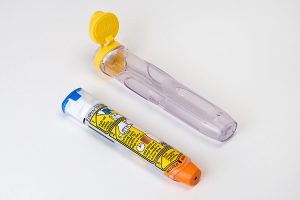 After a huge backlash against Mylan (NASDAQ:MYL) over hiking the price of the lifesaving EpiPen, the company has announced that it will soon be releasing a cheaper generic version of the device. The EpiPen provides a rapid injection of epinephrine to counter anaphylactic shock occurring from allergic reactions to a bee sting, peanut allergy or other cause. The generic version will have a price that is about half of the existing EpiPen’s.
After a huge backlash against Mylan (NASDAQ:MYL) over hiking the price of the lifesaving EpiPen, the company has announced that it will soon be releasing a cheaper generic version of the device. The EpiPen provides a rapid injection of epinephrine to counter anaphylactic shock occurring from allergic reactions to a bee sting, peanut allergy or other cause. The generic version will have a price that is about half of the existing EpiPen’s.
The company said that the generic EpiPen would be available in several weeks. The generic version will be available in both 0.15-milligram and 0.30-milligram strengths, like the current version on the market.
Even at $300, the generic would still be triple the price of the EpiPen in 2007, when it cost around $100 for a pair before Mylan acquired the product. Now, the EpiPen has a price of just above $600 for a pack of two. The huge increase of the list price for the severe-allergy drug injector has led to accusations of price gouging.
However, the company pledged to keep the list price the same, affecting insurers and federal health programs like Medicare and Medicaid paid for by taxpayers. After the acquisition, Mylan began steadily raising its price, with the price increases accelerating in recent years. The company said last week that reducing the list price of the drug would not necessarily mean that patients would pay less. Mylan has repeatedly pointed to high-deductible health plans as the main reason that patients are paying more for EpiPens.
Heather Bresch, chief executive of Mylan, called the company’s move “an extraordinary commercial response.” Brand-name drug companies rarely start selling authorized generic versions of their own products, and when they do, it is usually to undercut an outside generic competitor.
Mylan faces no immediate generic threat, but some companies are looking at developing less expensive products that achieve the same result. Epinephrine, the drug, is already generic, so patients are really paying for the auto-injector delivery system. Sanofi removed a nongeneric competitor from the market last year because of dosing issues. The Food and Drug Administration rejected a generic version from Teva earlier this year.
